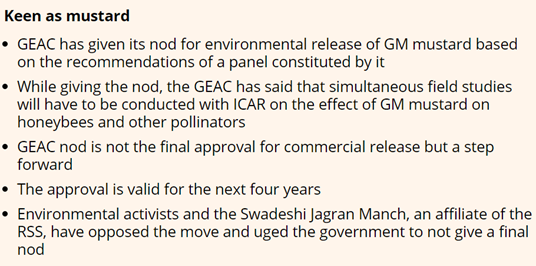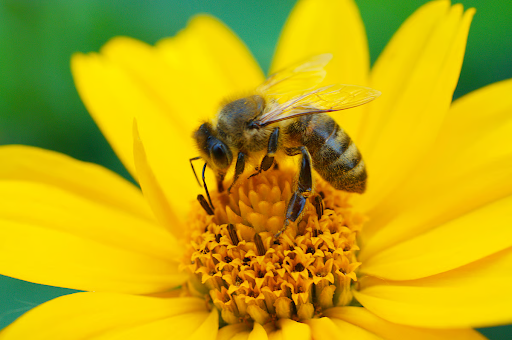Description

Disclaimer: Copyright infringement not intended.
Context
- The Genetic Engineering Appraisal Committee (GEAC) has recommended the environmental release of the genetically modified (GM) mustard variety DMH (Dhara Mustard Hybrid)-11, paving the way for the commercialisation of the country’s first GM food crop.
What is hybrid mustard?
- A hybrid crop is produced by the cross-breeding of two genetically different varieties that can be even from the same species. The first-generation (F1) offspring produced with this technique usually have higher yields than existing varieties.
- This hybridisation is difficult in mustard as its flowers have both female (pistil) and male (stamen) reproductive organs, which makes the plant self-pollinating. Thus developing hybrids for mustard has its limits.
- But scientists did it through genetic modification. They crossed a popular Indian mustard variety ‘Varuna’ (the barnase line) with an East European ‘Early Heera-2’ mutant (barstar) to develop DMH-11.
Benefits being clamied
- DMH-11 is claimed to have an average 28 per cent yield increase over Varun.
- DMH-11 has been shown to deliver 30 per cent higher yields than other existing varieties. The average yield of existing mustard varieties is around 1,000-1,200 kilograms per hectare, while the global average is over 2,000-2,200 kgs.
Approval by GEAC
- GEAC has approved the supervised environmental release of GM mustard and to conduct field demonstration studies on its effects, if any, on honey bees and other pollinators.
- Note: India has only approved one GM crop, Bt cotton, for commercial cultivation so far.

Significance
- The GM mustard represents a step towards the goal of developing robust, high-yielding hybrids while at the same time trying to reduce the environmental footprint of agriculture.
- Supporters say it will lead to greater food security due to increased yields, reduced costs for food production, reduced need for pesticides and resistance to pests and disease.
Concerns
- Data from (Directorate of) Rapeseed Mustard Research (DRMR), Bharatpur shows that the claim DMH-11 GM mustard would increase yield by 26 per cent is deceptive and misleading as there are several existing hybrid varieties that outperform the transgenic variety DMH-11.
- Some experts have also expressed concerns over the DMH-11 mustard variety being herbicide tolerant, which allows the farmers to kill the surrounding weeds without harming the crop. They fear excess use of the herbicide on GM crops would increase toxic chemicals in food and soil.
Final Thoughts
- Genetically modified foods can potentially solve many hunger and malnutrition problems in the world, as well as help protect and preserve the environment by increasing yields and reducing reliance upon chemical pesticides and herbicides.
- However, it is important to proceed with caution to avoid unfavorable consequences for the surroundings and our health, considering that genetic engineering technology is very powerful.

Must Read:
GM Crops: https://www.iasgyan.in/daily-current-affairs/gm-crops-26
|
GEAC
The GEAC is India's apex biotechnology regulatory body. It regulates the use, manufacture, storage, export and import of hazardous microorganisms or genetically-engineered organisms and cells in India. The Genetic Engineering Appraisal Committee (GEAC) functions under the Ministry of Environment, Forest and Climate Change (MoEF&CC). The Genetic Engineering Appraisal Committee (GEAC) is the statutory committee constituted under the “Rules for the Manufacture, Use/Import/Export and Storage of Hazardous Micro Organisms/Genetically Engineered Organisms or Cells (Rules, 1989)” framed under Environment (Protection) Act, 1986. As per 1989 Rules, it is responsible for appraisal of activities involving large scale use of hazardous microorganisms and recombinants in research and industrial production from the environmental angle. The committee is also responsible for appraisal of proposals relating to release of genetically engineered (GE) organisms and products into the enviornment including experimental field trials.
|
https://www.business-standard.com/article/economy-policy/govt-advisory-committee-recommends-environment-release-of-gm-mustard-122102600305_1.html
https://www.business-standard.com/article/economy-policy/govt-advisory-committee-recommends-environment-release-of-gm-mustard-122102600305_1.html










